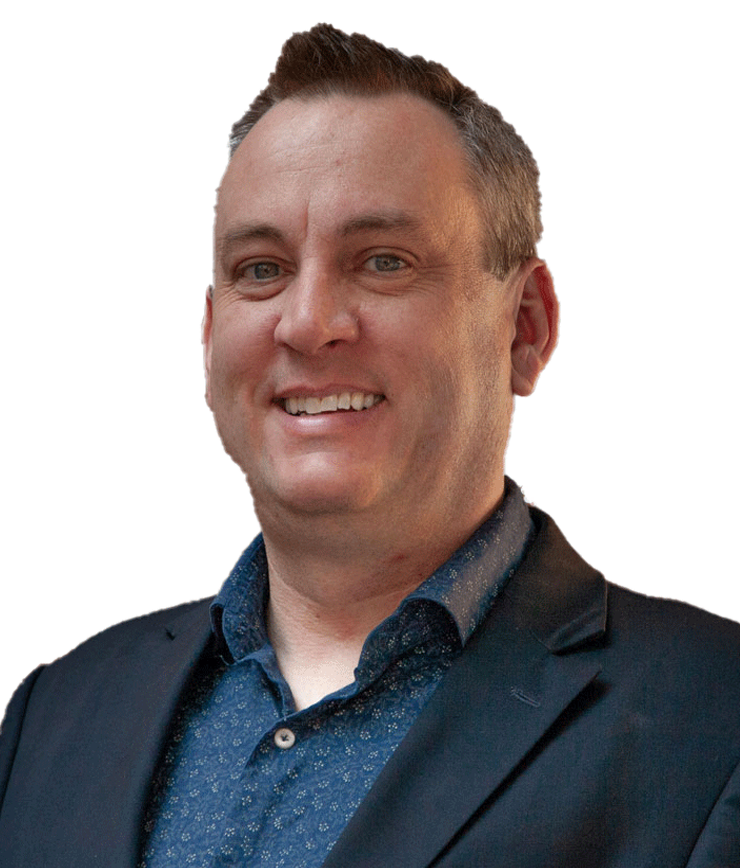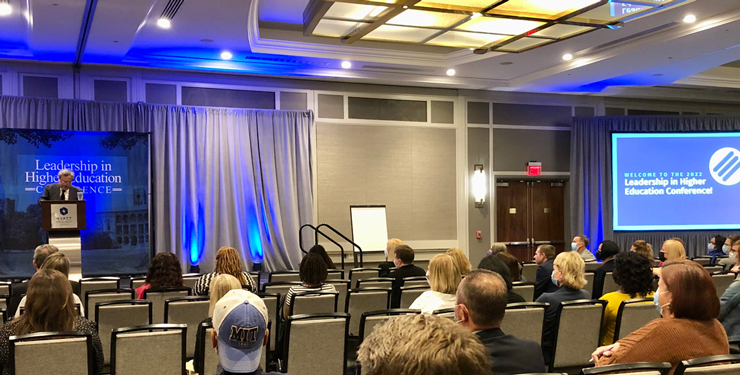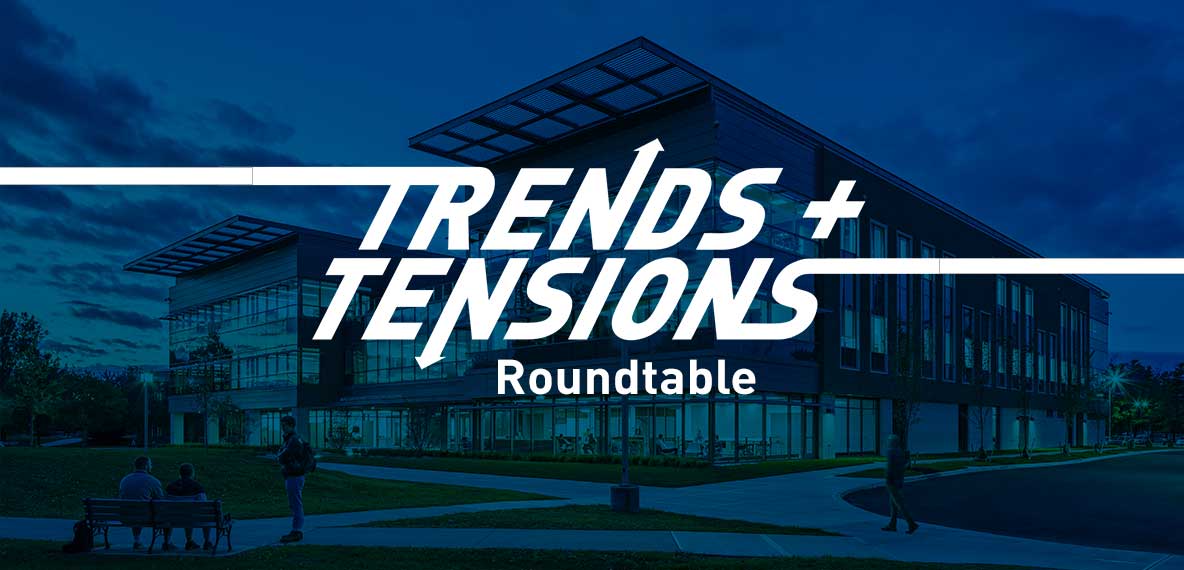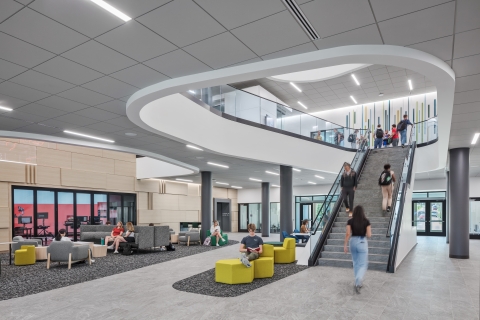
Technology's Influence on Educational Equality: Part 1
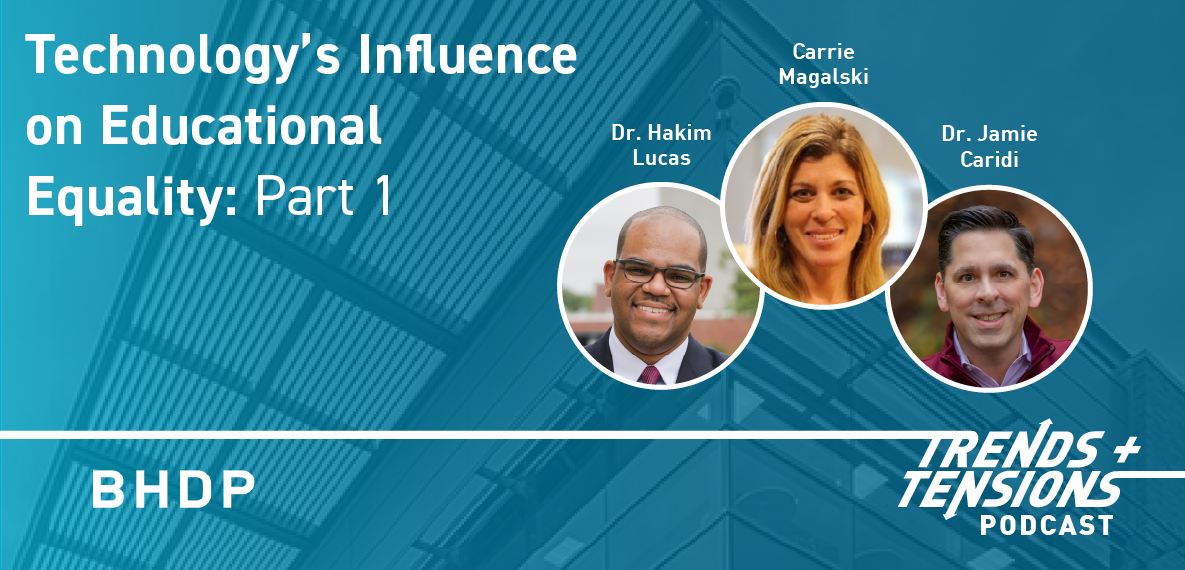
Want to listen on another platform? Choose your platform here.
Episode Transcript
(Music Intro)
Brian Trainer, Host: Welcome to a special edition of Trends + Tensions, presented by BHDP, where we discuss Trends in Architectural and Interior design and the competing priorities or Tensions that arise from integrating new ideas into existing organizations, enterprises, and institutions. This episode is part of the “Higher Education Strategic Partnership” series. In this episode “Technology’s Influence on Educational Equality: Part 1”, special guest hosts Dr. Jamie Caridi, President of Terra Firma, and Carrie Magalski, Director of Client Services for Terra Firma, chat with Dr. Hakim Lucas, President of Virginia Union University, about the strategic partnership the university has started with Paragon VTOL. Technology is paving the way for the future, and Dr. Lucas and Virginia Union University are at the forefront of this movement. By providing students with technology for learning, Dr. Lucas is overcoming the stigma associated with the desire to learn and economic instability. I am your host, Brian Trainer, senior strategist for BHDP. Let’s get started.
Carrie Magalski: Good morning, Dr. Lucas. The strategic partnership that you have with Paragon VTOL—I know you have a lot of moving parts with it, but what would be, you know, your most compelling aspect of it that you would like to share?
Dr. Hakim Lucas: There isn't one, but what I can do is journey through the significances and talk about the first significance of the partnership that comes to mind when I think of that. The first significance is the realization, in the midst of the double pandemics, of how poverty is still the most important issue that faces American economy, American social, cultural issues, and economic issues. I think our work in tech and innovation is a tech justice issue more than anything, and it's really about how we're one providing the solution for diverse populations that are often disadvantaged to experience what it means to live in a world that is connected, how technology has accelerated singularity in a way that has led us into this fourth Industrial Revolution. To go from technology as transformation and transportation to our second, which is cyber security and resiliency. And then really finding the Nexus between community any policing, cyber security, and resiliency and the ways in which we can become protective about not just data but our innovations. Oftentimes technologies that are surveillance type are not viewed as opportunities to participate in employment, and to say that “no, these technologies are not created simply to police and to surveil your community, but our opportunities for you to participate in as an employable industry.” The third for us is edutech, and how do we create technologies that accelerate learning? Primarily in learning laws, particularly in AI or students with many disabilities who have speech-to-writing conversion issues. We're finding a lot of that, that students aren't learning penmanship, they aren't learning how to write anymore, so they're writing like they're texting, and it's this whole language of a culture that we have to get them back to communicating and English literature and the ways in which AI works to help translate for them the language of their culture into a language of communication of success. And so, from that simple strategy to the gamification of university enrollment processes, Jamie, you appreciate. No matter what happens in whatever age, poverty still allows the inability to accurately and correctly fill out a financial aid app to persist. But poverty causes a paralysis in knowing how to get through the functions that get you access to empowerment. But it is the Innovation that really helps our students begin to navigate in a world that has not just poverty gaps but generational poverty gaps and how we begin to use technology to allow them access to a future. I think that is the number one significance that always comes to mind is how we're using technology to innovate ways and pathways out of poverty into the working middle class.
Dr. Jamie Caridi: I think one of the things we're mindful of in this process is the audience is going to see these three schools that are doing phenomenal things, but then they're going to pretty quickly be overwhelmed by their own circumstance. Hakim, can you just speak for a minute about tactically and kind of demonstrate how your relationship with Thanos and Paragon kind of developed? How you guys move through a process of brainstorming and kind of riffing and ideating to true due diligence and saying, “how do we run this to a yes or no without it wasting our time,” and figuring out if there's a there and then you know how the financing came together. Can you just speak to some of those fundamental building blocks to the relationship? You know, one of the things we hear repeatedly is those are phenomenal things, but how do you do it?
Dr. Lucas: Well, I can tell you. The first is a lot of luck. The fact that we were thinking about a Thanos and a Paragon when a Thanos and Paragon was thinking about a Lucas and Virginia Union. Like we wanted to do something in tech and innovation with a minority partner that we thought would understand and have a motivation that was different to do things that resulted in generational wealth while he was at the same time looking to impact his life work with a minority institution, particularly a historically black college, our mutual search for each other resulted in this moment. I now got the letters of support for the grants from my colleagues who are waiting for the ideation and innovation so that they can replicate it with their students. We're in a partnership with 14 HBCUs that we share information and discoveries and program participants, so everything is scaled out ultimately on him coming to the MOU. So, structuring the relationship and working, putting the teams together once we have the MOU to structure how we will work because you want to get your lawyers in there, to basically say, “let's pierce this thing down, where do we want to start, how do we want to go? Let's be integrated,” and understanding that research grants, coming up with the innovation, investment, public-private partnerships, and then ultimately scaling the product but connecting all R&D to the value proposition of the school so that students immediately participate in that battle. We're once again, our first vertical in the center for Tech and Innovation is transportation, but that directly connects to all students being able to access an electric vehicle. So not only are they building the electric vehicle, but it's a part of their tuition cost so that they get one by time they graduate, and we're doing it in the second year. So, it becomes a value proposition that's delivered as a part of that R&D as a real field that helps to use technology to motivate retention and persistence, particularly when the threats of attrition and a student that's highly sensitized to poverty, they need something to push them forward and the internal forces to motivate our technological life. Well, here's the car. As a matter of fact, you need to build it, though. You need to participate in learning about this and discovering its importance. And that's pretty much how we sensitize the research and development into the faculty and administrative work but also tied it into value proposition so we can increase our costs and the investment of students won't be perceived as debt, but an investment in who they are in their life because we're attracting them out of poverty into generational wealth.
Dr. Caridi: Hakim, is that separate—the electric vehicle initiative? Is Paragon tied into that, or is that separate?
Dr. Lucas: You know, they are the ones who build it! It takes about a year to make, so at admissions, it becomes a fee that they get to choose if they want a vehicle. The cost of the vehicle is approximately $20,000. It gets divided into four payments for four years, and they get it in their sophomore year because they can't have a car on campus their first year.
Dr. Caridi: Is there other things we need to be very mindful of, you know, obviously, we'll talk to Thanos tomorrow, but anything else project-based kind of like the two we've already discussed that—I mean, those are big things already, so that's a lot there.
Carrie: In particular, I saw on their website when I was doing some research on there that they are working on the Vertical Lift Vehicle, is that going to be integrated with your electric car project or research?
Dr. Lucas: The students and the faculty integrate into his R&D chain, so the first is the drones. So, the drone work and the Drone Academy that he has integrated with our youth development, dual enrollment, and our participation with RPS. And so, it's important that the integration first creates and partners with our educational pipeline. So, we just got approved a $200,000 planning grant to build a lab school with the Commonwealth of Virginia that's focused around 6th to 9th grade on the use of technology and STEM, in which their curriculum will be a preparation to participate in college-based training in the tech and innovation fields. And so that's the first level of partnership that you have with us. The second is so when we get them excited about drone academies, technology, transformation, transportation, and what can happen—then the next step is to have them appear through the educational programming. And that's where we get into a Bachelor’s degree in Computer Science, Cyber Security, and a Master's in Data Science. We don't have a Ph.D. program right now, but we're looking to adopt that Ph.D. in Cyber Management, Resiliency, and all of that. So, the center then through Paragon, and then we'll import, I think it's two or three other partners come together, to provide the curriculum and the research experiences of Baccalaureate and Masters, and then soon to be Ph.D. students. The third is, how do you then take the IP, create the widget, and go to market, right? Because you need industry. Now that's where the V in VTOL is, and that's where the use of the four major building blocks is. The four major building blocks of our partnership are one the IP and the research. Two, the energy sources for which we power, so it's not lithium battery that is hydrogen-based. And other elements that allow other elemental reactions, so high-level chemistry and bio students—and like I said, it becomes very interdisciplinary. The third is the manufacturing and supply chain and to be able to put together all of the vehicles. That's workforce development, that's through our Virginia Union Technical College, and putting together all these trades and micro-credentials that go with it that meet manufacturing and supply chain. The fourth is the ability to influence the local economy.
Dr. Caridi: I think we'd be remiss—you have a philosophy about expectations of outcomes of your students, and it was like this multi-point plan that are absolutes for them to graduate from Virginia Union—we'll be remiss if we didn't ask you since you were technically on the record now.
Dr. Lucas: Oh, absolutely! Everything is structured in higher education, so all the listeners should understand that the structure that we produce in higher education, not because we want to, is because we have to. And it's all tied to Title IV and getting financial aid, particularly for our regional accreditor, which is the Southern Association of Schools and Colleges and a SAC COC, Commission on Colleges is a COC part. We have to do something called QEP. QEP is a Quality Enhancement Plan, and it is one of the standards that define what do we want to do with all of our students to ensure that we help them develop, not just in the classroom but out of the classroom. Our QEP is called “Tomorrow Starts Today,” and it anchors the thought of something called the 9 Noble Achievements and the 9 Determinants of generational wealth. And so, our QEP simply says with continued reflection on the various life skills that are needed to actualize the intellectual knowledge that is being gained through the student learning outcomes in the various academic programs, that students can reflect and improving their decision-making to utilize their knowledge skills and competencies to live more productive lives as a pathway out of poverty into generational wealth. Generational wealth is simply defined as living in an economic status where your children can inherit your assets. Acquiring assets that can be transferred, whether your ultra-high net worth or working class, you still have a home that can be transferred. And so, these 9 Noble Achievements are the ways in which we convert student learning outcomes into life skills that must be demonstrated and then credentialized. And so, we basically are saying we understand that 100% of our students won't make it through 100% of the curriculum. However, that does not mean that they can't in their 20% time at the university; while they might not persist to graduation, it doesn't mean that they cannot acquire something that will transform their lives. And so, micro-credentialing is not an opposition to degree acquisition, but it is a complement to it. If one of the Noble 9 is scholarship, which is that we want you to graduate with a 3.0, then we understand that the micro-credential that is behind or connected to that student learning outcome as a standard of excellence for the university to maintain its brand through the quality of its student and graduate—that you have to understand how to do advisement, you have to understand how to know when you need tutoring, you have to understand how to manage your time, so these 3 micro-credentials become a part of your work; time management, academic advisement, and the third is tutorial services—knowing how to understand your learning style and to understand when you need to learn in a very different way or when you need help. These 3 micro-credentials then birth, if you will, this outcome of student performance metrics. And then, when you achieve a 3.0, you get to participate in what we know is a determinant of generational wealth, which is internship. So, it's life skills with intellectual knowledge skills and competencies that come together in a way that benchmark and separate the life skills in the micro-credentialing that then allows the students to hit search benchmarks that go with their educational attainment in a very differentiated way and disaggregated way in a micro way of looking at persistence. And it's just a micro-economy of persistence that they achieve if you will, these benchmarks and understand the life skills that go with these benchmarks because we're not just giving them an education. You have an education, and then you have an experience that prepares you for life, and that's the integration between the two. I have a whole division that’s for student development and success that works to ensure that the QEP becomes the value prop and that the value prop is delivered, and as we always say, quality transactions that lead to quality transformation. If they don't trust you to get their financial aid on time, they're not going to trust you to advise them in their life.
Carrie: That's very true!
Dr. Lucas: I'll be honest, you know, the basis of my thinking is that private institutions and private wealth need to come together to solve private problems. I am trying to reduce a dependency on public money to solve private problems. And foundations, private high net worth, ultra-high net worth individuals, private corporations, private institutions like we can do this, and then public dollars just become added value to replicate the benefits of what we solve for everyone.
Dr. Caridi: I can't think of a more perfect way to bring the conversation in for a landing!
Carrie: Yeah!
Dr. Caridi: Your comment and Dr. Lucas’s kind of put the exclamation point on things.
Carrie: Wonderful. Thank you so much for your time!
Dr. Lucas: Thank you, thank you! All right.
Dr. Caridi: Have a great afternoon!
Dr. Lucas: You too!
Carrie: Take care, Dr. Lucas, bye-bye.
Brian: Thank you for joining Trends + Tensions presented by BHDP for this special episode, “Technology’s Influence on Educational Equality: Part 1,” with contributing hosts Dr. Jamie Caridi and Carrie Magalski and their guest Dr. Hakim Lucas. If you appreciate what you have heard, please rate, subscribe, and give us a review. I am Brian Trainer, your host, and I hope you’ll join us for part 2 when we continue this topic with Dwight “Thanos” Smith, Chief Visionary Officer of Paragon VTOL Aerospace.
Author
Content Type
Podcast
Date
May 15, 2023
Market
Practice
Topic
Technology
Higher Education Strategic Partnerships

